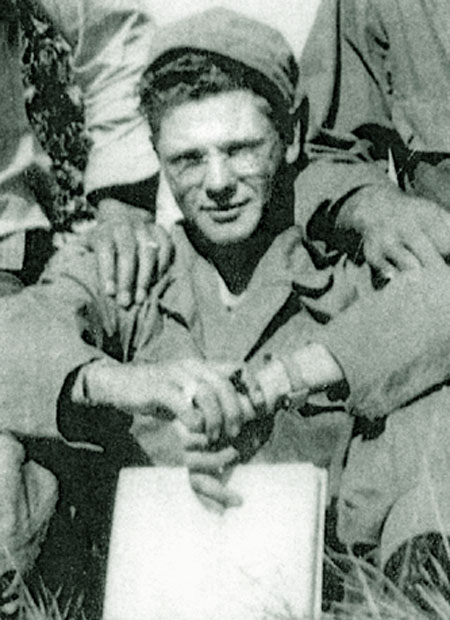David Elliot Pursley
Elko, Nevada
Born 1932
Corporal, U.S. Army
Service Number 56132860
Missing in Action – Presumed Dead
Died July 14, 1953 in Korea
Corporal Pursley was a member of Battery A, 955th Field Artillery Battalion, U.S. Army. He was listed as Missing in Action while fighting the enemy in Korea on July 14, 1953. He was presumed dead on July 15, 1954.
Corporal Pursley was awarded the Purple Heart, the Korean Service Medal, the United Nations Service Medal, the National Defense Service Medal and the Korean War Service Medal.
Frank X. Mullen Jr. RENO GAZETTE-JOURNAL
19 September 2004
For 51 years, Army Corporal David Elliot Pursley of Owyhee was listed as missing-in-action on a Korean battlefield, his remains lost in the fog of war.
Tuesday, his surviving family members are scheduled to lay his bones to rest with full military honors in Arlington National Cemetery in Virginia. A story in the Reno Gazette-Journal in 2000 and an Army laboratory in Hawaii helped his family claim Pursley’s remains, which were unidentified for half a century.
“We’ve shed a lot of tears since he was reported missing in 1953,” said David’s brother, James Pursley of Palm Bay, Flprida. “It gives us some closure now.”
David Pursley, 21, and two other U.S. soldiers were acting as forward artillery spotters on July 14, 1953, on a hill in Kangwon Province, North Korea. In the early morning hours, units of the Chinese People’s Volunteer Army overran the spotters’ position. At 6 a.m., all radio contact with the three Americans was lost, according to the Pentagon’s POW/MIA Accounting Command at Hickham Air Force Base in Hawaii.
The men’s bodies were in enemy territory, beyond the reach of their comrades. The war ended 12 days later. Pursley was among the conflict’s last U.S. casualties, listed as missing and presumed dead.
In 1993, the North Korean government turned over 34 boxes of bones, said to be the remains of U.S. soldiers, to the U.N. Command. The bones were the remains of many people, but one of the boxes contained David Pursley’s Army dog tag and identification bracelet.
None of the remains could be identified at the time, and Pursley’s family members weren’t told about the dog tag and bracelet. As DNA identification became more common during the late 1990s, the Army notified veterans’ groups that it needed samples from family members of soldiers lost in Korea to compare with DNA from the bones.
James Pursley and his wife Chris attended a Korean War anniversary event in Reno in June 2000 and read a Reno Gazette-Journal story about the bones. David Pursley was listed in the story as one of three Nevadans whose remains never were found.
“We were so thankful that his name was in that story,” Chris Pursley said. “James and his sister gave blood and a cheek swab samples so they could compare the DNA. It matched. It’s a miracle.”
In April, the family was notified of the results.
“We were really shocked,” Chris Pursley said. “Most of his family of nine children is gone, but there are three siblings left. We never thought we’d know what happened to him.”
Tomorrow in Virginia, a bugle will blow “Taps” and a flag will be lifted from a coffin and folded in the shape of a tri-cornered hat. Soldiers will stand at attention in a forest of white marble headstones. Relatives will remember a young man from Elko County who stayed at his post in the face of impossible odds — and died so long ago and far away.
“We thought he’d be lost forever,” James Pursley said. “But now he’s come home.”
Michael Robert Patterson was born in Arlington and is the son of a former officer of the US Army. So it was no wonder that sooner or later his interests drew him to American history and especially to American military history. Many of his articles can be found on renowned portals like the New York Times, Washingtonpost or Wikipedia.
Reviewed by: Michael Howard

